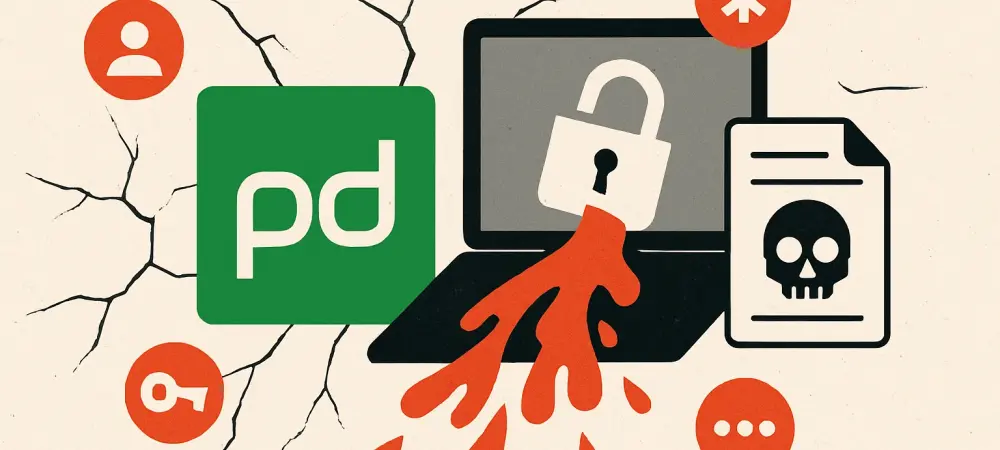What happens when a trusted digital tool turns into a silent threat? In today’s interconnected business landscape, a single flaw in a third-party application can unravel the security of even the most fortified organizations, as demonstrated by the recent breach at PagerDuty, a leader in digital operations management. This incident has sent shockwaves through the tech industry, exposing a vulnerability in Salesloft Drift’s integration with Salesforce. This isn’t just a glitch—it’s a stark warning about the unseen risks lurking in the tools companies rely on every day. How did this happen, and what does it mean for the future of digital security?
The Cracks in the Digital Foundation
The significance of this breach extends far beyond PagerDuty itself. It highlights a critical blind spot in modern business operations: the growing dependence on third-party tools. As companies integrate more applications to streamline workflows, they inadvertently expand their attack surface. This incident, affecting not just PagerDuty but also giants like Palo Alto Networks and Google, underscores a troubling reality—supply chain attacks are becoming a preferred method for cybercriminals to exploit trusted connections. The stakes are high, with exposed data potentially fueling phishing schemes and fraud.
A Breach That Hit Multiple Targets
The timeline of the incident began on August 20, when Salesloft alerted PagerDuty to a potential flaw in Drift’s OAuth integration with Salesforce. Within three days, confirmation came that attackers had exploited this vulnerability, gaining unauthorized access to customer contact information such as names, emails, and phone numbers within PagerDuty’s Salesforce instance. While core systems and credentials remained secure, the breach raised immediate concerns about targeted social engineering attacks against unsuspecting customers.
This wasn’t an isolated event confined to one company. The same flaw impacted other major players in the tech and cybersecurity space, including Zscaler, Cloudflare, and Google. The scope of exposed data varied across these organizations—some reported leaks of business contacts, while others faced compromises of internal sales records and support case details. This multi-company crisis reveals how a single weak link in a third-party tool can create a domino effect across entire industries.
The broader implication is a wake-up call about the fragility of interconnected systems. As businesses continue to adopt integrated platforms for efficiency, the risk of such breaches escalates. A vulnerability in one application can compromise countless others, emphasizing the urgent need for a fundamental shift in how security protocols are designed and enforced in digital ecosystems.
Experts Weigh In on the Growing Threat
Cybersecurity professionals have been quick to react to this unfolding situation. A spokesperson from Salesloft, speaking on August 27, urged Drift customers to scrutinize their third-party connections and take immediate protective measures. This advice aligns with broader industry concerns about the rising frequency of supply chain attacks, which exploit trusted relationships to bypass even the most robust defenses.
Insights from Google’s Threat Intelligence Group, working alongside Salesforce, have been instrumental in tracking the threat and sharing technical details to mitigate further damage. One cybersecurity analyst noted, “Third-party tools are often the soft underbelly of an organization’s security posture. Attackers know this and target them relentlessly.” Such expert perspectives highlight the evolving nature of cyber threats and the pressing need for vigilance.
PagerDuty’s response has been notably transparent, with the company disabling Drift access to its Salesforce data and launching a comprehensive investigation. This proactive stance, coupled with public warnings to customers about potential phishing risks, reflects an industry grappling with how to balance innovation with security in an increasingly complex digital landscape.
Lessons from a Costly Oversight
The fallout from this breach offers a critical opportunity for organizations to reassess their approach to third-party integrations. Regular audits of connected tools, especially those accessing sensitive data like Salesforce, are essential to ensure vendors adhere to stringent security standards. Limiting permissions to the bare minimum required for functionality can also reduce the risk of overexposure.
Beyond technical safeguards, education plays a vital role. Training employees to spot phishing attempts and advising customers to verify communications through trusted channels can mitigate the impact of leaked contact data. Real-time monitoring for unusual activity in integrated systems, paired with swift alert mechanisms, further strengthens defenses against unauthorized access. Having a robust incident response plan is equally crucial. Organizations must be prepared to disable compromised integrations, communicate transparently with stakeholders, and adapt quickly to emerging threats. Drawing from PagerDuty’s example, proactive measures and clear messaging can help maintain trust even in the face of a security lapse.
Reflections on a Systemic Challenge
Looking back, the breach at PagerDuty served as a sobering reminder of the hidden vulnerabilities embedded in third-party tools. It exposed how a single flaw in Salesloft Drift’s integration with Salesforce rippled across multiple organizations, threatening customer data and trust. The incident illuminated the urgent need for stronger safeguards in an era where digital dependencies continue to grow.
The path forward demands a collective effort to rethink security practices. Businesses must prioritize rigorous vetting of third-party applications and invest in continuous monitoring to detect threats before they escalate. By fostering a culture of caution and preparedness, companies can better navigate the complexities of supply chain risks. Ultimately, this event underscores that in the digital age, security is not just a technical requirement but a cornerstone of sustainable operations.

